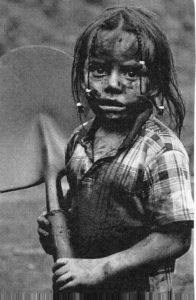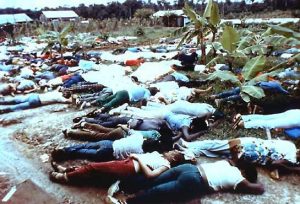On April 25, 1986 in the city of Chernobyl in the Soviet Union, Dr. Valentin Belokon was just getting back to his office from tending to a person that had an asthma attack, when he saw two explosions at the nuclear power plant. When he was informed by his paramedical assistant that there had been an explosion that released massive amounts of radiation, he immediately sent two ambulances to the site, with him in pursuit. When Dr. Belokon arrived at the site, an eighteen-year-old man was brought to him with a very severe headache. The young man kept vomiting and he had nausea. Other people came to Dr. Belokon with similar symptoms, along with others like dryness and a blocked throat. Many of them were also beginning to act in a very strange manner. They would lose their ability to speak and would be confused and disoriented. All of these people were suffering from radiation sickness caused by their exposure radiation.1

Many of the people that had experienced the radiation first-hand were hospitalized and were being treated for radiation sickness.2 The numbers of those affected dramatically increased in the following months, as it was estimated that 600,000 people were exposed to the radiation. Victims were sent to different areas, due to the high number of people that needed to be examined and treated. Those that showed no sign of medical issues were sent home and asked to come back the following day for a follow-up examination. Patients that were sick, however, remained in the hospital and were seen by “the best scientific and medical specialists of the country, from specialized clinics in Moscow and other cities.”3 The patients stayed for months in the hospital, such as Dr. Belokon himself, who was discharged in the fall of 1986. Many of them were permanently damaged and affected by the radiation.4
The biggest problem that arose from the absorption of the radiation, apart from the radiation sickness, was that those who were exposed would pass on the health problems that the radiation caused to generations to come. The rates of cancer would surely rise in later years, especially thyroid cancer, as the thyroid would absorb much of the radiation.5 Other problems that would arise would be immune system deficiencies, cardiovascular diseases, and deformities in the children of those who were exposed to the high amounts of radiation. These health problems would arise due to the fact that the massive amounts of radiation absorbed ultimately changes the genetic structure of those that were affected and their offspring.6 The estimated number of deaths that would be caused from the indirect exposure of the radiation was set to approximately 4,000.7

Chernobyl was one of the biggest radiation disaster that has occurred in history. Thousands of people were affected by the biological and internal problems that the radiation caused. Many people are still being treated for cancers and other illnesses that can be traced back to the explosion. There were also many deaths that were caused throughout due to the nuclear power plant accident that occurred in the city of Chernobyl.
- Zhores A. Medvedev, The Legacy of Chernobyl (New York: W.W. Norton 1990), 132-133. ↵
- Zhores A. Medvedev, The Legacy of Chernobyl (New York: W.W. Norton 1990), 136. ↵
- Mikhail Gorbachev, “Vital speeches of the Day,” June 26,1986. ↵
- Zhores A. Medvedev, The Legacy of Chernobyl (New York: W.W. Norton 1990), 136. ↵
- Adriana Petryna, Life Exposed: Biological Citizens After Chernobyl ( New Jersey: Princeton University Press 2003), 1-2. ↵
- Aleksandra Fucic, “Follow up studies on genome damage in children after Chernobyl nuclear power plant accident,” Archives of Toxicology 9, no.9 (June 2016): 2147-2155. ↵
- Columbia Electronic Encyclopedia, 2017, s.v. “Chernobyl.” ↵



56 comments
Alexandra Camarena
I found this article very fascinating! I remember learning about Chernobyl in high school and always finding it very interesting. I liked how the author chose to directly focus on Dr. Valentin Belokon, because it turned it into a story rather than a summary of the tragedy. However, this article was very informational and helped me understand truly how many lives were affected by the tragedy.
Samson Pullattu
People fear using nuclear power as an alternative resource to fossil fuels, and the effects brought by the cataclysmic event at Chernobyl is a major reason why. A great deal of suffering and death were inflicted upon many of the town’s inhabitants and those nearby, even if they were only exposed indirectly. All those who survived had probably had drastic changes to their very DNA structures and of future generations as well. With these being possible outcomes, one cannot blame those who worry about the implementation of nuclear power plants. Crucial steps will have to be taken to safeguard these plants to prevent another Chernobyl.
Alexis Aranda
This was a very interesting read for me. I remember watching the Chernobyl adaptation on Amazon Prime and was so heartbroken to see how many people were affected by the radiation. So many lives were lost and/ or affected by the debris and radiation from the explosions. I think it’s interesting, that even today, so many parts are still too toxic to touch or visit.
Nicholas Robitille
I had heard of the unprecedented disaster of Chernobyl prior to this article, but I had always thought of those killed in the blast without thinking about those who were affected by the radiation for the rest of their lives. Chernobyl spread its radiation across much of Russia, and when these people were diagnosed, radiation studies had not come along very much and the people who were affected by the radiation were not properly quarantined. I was very surprised to hear that some people were still suffering from this disaster that took place so long ago. I hope that nothing of this sort ever ends up happening again.
Kenneth Gilley
What an interesting article! The Chernobyl disaster was such a tragic event. So many people were affected by the massive amounts of radiation that were released because of the explosions. Another bad consequence of Chernobyl was that it played a large role in bringing the American nuclear power programs to a grinding halt. In the United States, reactors had been developed that, unlike Chernobyl, were literally fail-safe. Because of how they were engineered, they could never fail. Nevertheless, the American people were so shocked by the Chernobyl disaster that public opinion decidedly shifted away from nuclear power.
Javier Camacho
I always read about this disaster and remember always hearing about it growing up, but I was never aware of just how many people were affected and how many people died as well. another thing that I was unaware of was the fact that people today were still feeling the effects from indirect radiation that their ancestors passed down to them. This clearly is one of the worst disasters that has ever happened in the world that has been recorded.
Celeste Flores
I first heard about the Chernobyl nuclear disaster in my science class when I was about nine years old, I remember not understanding how an explosion could have such disastrous effects even years after it happened! After asking my teacher she explained it to me and to this day I still have the same question I had in my mind when she explained it, why didn’t they leave right after the explosion? It is extremely sad and unfortunate that many generations were and still are seriously affected by this disaster. Furthermore, I am sure that the disaster could have been avoided if there paid more attention to the safety of the nuclear plant.
Ilse Amaya
The Chernobyl disaster was a really devastating event that not many people know of. Unfortunately, it reminds us how humans can make mistakes that can affect the entire world in a matter of seconds. I acknowledge that nuclear energy can be useful to humans, in medicine, and weapons. Furthermore, occurrences like this one make us think if it’s really worth it.
Diego Terrazas
Such nuclear disasters begs the question of how deadly they can be. There is the explosion and then the aftermath which is the infliction of radiation. These indirect radiation infliction are quite fatal and it is very unfortunate that the radiation has effects on offspring and to future generations. I wonder of how long its effects can be passed down and how long it takes for it to completely subside.
Leeza Cordova
Chernobyl is something that most people are not aware of, or do not even fully grasp how toxic it was to innocent people. This article reminded me of one I read in a core class concerning the use of Agent Orange, a similar chemical to the one above with deadly effects. It is crazy to think about how many people were affected by this chemical and how quickly the effects were seen.